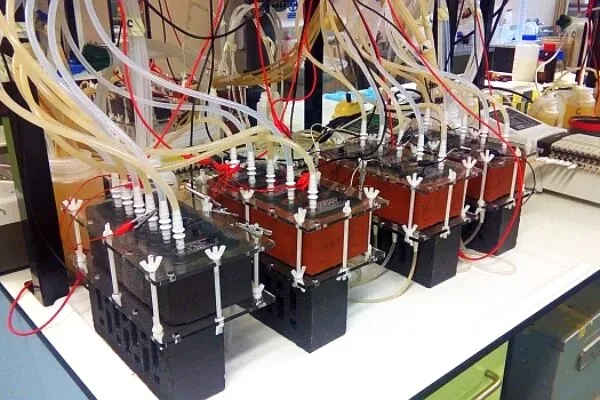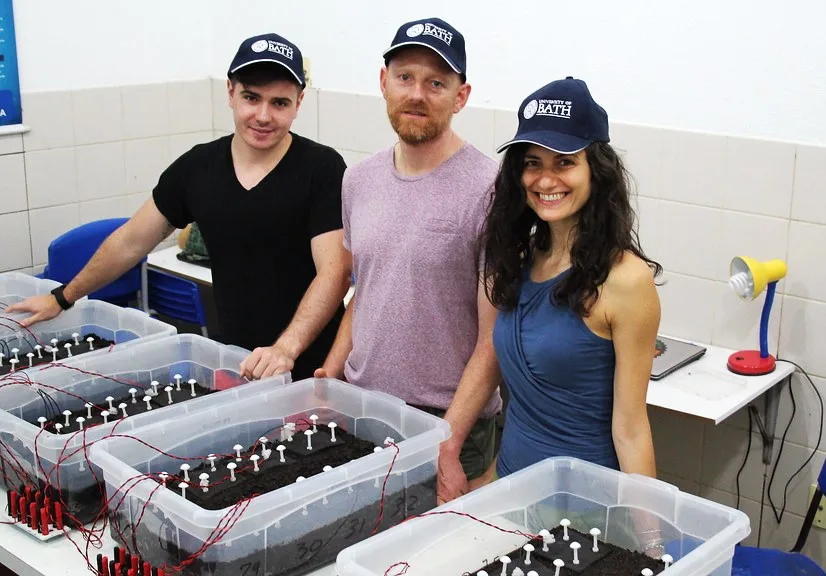The Power of Microbial Fuel Cells: A Green Revolution in Electricity Generation
Microbial Fuel Cells (MFCs) have emerged as revolutionary bio electro chemical devices that harness the power of microorganisms to generate electricity from organic and inorganic compounds. This eco-friendly technology not only produces sustainable energy but also holds immense promise for wastewater treatment. In this article, we’ll delve into the workings of MFCs, their applications, electrode materials, and the challenges they face.

How Microbial Fuel Cells Work:
At the heart of MFCs is the ingenious use of microorganisms to decompose substrates at the anode, generating electrons and protons. These charges then flow to the cathode, where electricity is produced. The device typically consists of an anode, a cathode, and a proton exchange membrane (PEM) that separates the two.
Applications of Microbial Fuel Cells:
MFCs find applications in various fields, including bioelectricity generation, wastewater treatment, bioremediation of toxic compounds, biohydrogen production, and biosensors. These bioreactors utilize organic waste carbon and bacteria to convert chemical energy into electrical energy under anaerobic conditions, making them a sustainable solution for electricity production from biowaste.
Electrode Materials:
The choice of electrode materials significantly influences the outcomes of MFCs for different applications. Common anode materials include Carbon-based electrodes, Graphite, Stainless Steel, and Ceramic electrodes. These materials play a crucial role in enhancing the efficiency and performance of MFCs.
Plant Microbial Fuel Cells:
A fascinating subset of MFCs is the plant microbial fuel cell, which utilizes organic matter available in wetland systems. This can include exudation from plant roots or other mechanisms such as bacterial conversion, hydrolysis, or rhizodeposition. This opens new avenues for harnessing renewable energy from natural ecosystems.
History of Microbial Fuel Cells:
The concept of using microbes to produce electricity dates back to the early twentieth century when Michael Cressé Potter generated electricity from Saccharomyces cerevisiae in 1911. However, the idea received limited attention at the time. Today, the fundamental principle involves converting chemical energy into electric energy from both organic and inorganic compounds through the metabolic processes of microbes.
Advantages of Microbial Fuel Cells:
MFCs offer a more energy-efficient alternative to traditional wastewater treatment plants. By generating electricity from organic matter in wastewater, MFCs can offset the energy needs of treatment plants. Research indicates that MFCs can reduce organic material in sewage wastewater by up to 80%, showcasing their potential for sustainable water treatment.

Challenges in Microbial Fuel Cell Development:
Despite their promising applications, scaling up MFCs for practical use remains a significant challenge. This includes increasing the capacity of wastewater treatment and efficiently transferring energy from multiple cells in one MFC system.
In conclusion, Microbial Fuel Cells represent a green revolution in electricity generation and wastewater treatment. By tapping into the metabolic power of bacteria, MFCs offer a sustainable and eco-friendly approach to producing electricity while concurrently purifying wastewater. As research continues, overcoming challenges in scaling up MFCs will unlock their full potential for practical applications in the future.
References:
Jahan, N.; Tahmid, M.; Shoronika, A.Z.; Fariha, A.; Roy, H.; Pervez, M.N.; Cai, Y.; Naddeo, V.; Islam, M.S. A Comprehensive Review on the Sustainable Treatment of Textile Wastewater: Zero Liquid Discharge and Resource Recovery Perspectives. Sustainability 2022, 14, 15398. [Google Scholar] [CrossRef]
Rahman, T.U.; Roy, H.; Islam, M.R.; Tahmid, M.; Fariha, A.; Mazumder, A.; Tasnim, N.; Pervez, M.N.; Cai, Y.; Naddeo, V.; et al. The Advancement in Membrane Bioreactor (MBR) Technology toward Sustainable Industrial Wastewater Management. Membranes 2023, 13, 181. [Google Scholar] [CrossRef] [PubMed]
Colantonio, N. Heavy Metal Removal from Wastewater Using Microbial Electrolysis Cells; McMaster University: Hamilton, Canada, 2016. [Google Scholar]
Kurniawan, T.A.; Chan, G.Y.S.; Lo, W.H.; Babel, S. Physico–Chemical Treatment Techniques for Wastewater Laden with Heavy Metals. Chem. Eng. J. 2006, 118, 83–98. [Google Scholar] [CrossRef]
Al Moinee, A.; Islam, T.; Sanzida, N. Effect of Electrodes, Aeration, Salt Bridges and Source of Microbes in a Mediator-Free Double Chambered Microbial Fuel Cell. In Proceedings of the International Conference on Chemical Engineering, Dhaka, Bangladesh, 20 December 2018. [Google Scholar]

Can you be more specific about the content of your article? After reading it, I still have some doubts. Hope you can help me.
I have read your article carefully and I agree with you very much. This has provided a great help for my thesis writing, and I will seriously improve it. However, I don’t know much about a certain place. Can you help me?